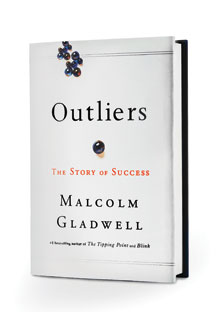What Makes a Person an Astounding Success?

Photo: Olivia Barr
Malcolm Gladwell turns his trendspotting skills to the exceptionally gifted.
Outliers: The Story of SuccessBy Malcolm Gladwell
320 pages; Little, Brown and Company
Why do some people become superstars, while others born with equal talent or intellect end up on more mundane paths? In his new book, Outliers, best-selling New Yorker writer Malcolm Gladwell (The Tipping Point, Blink) considers exceptional achievers, including Bill Gates, the Beatles, and Robert Oppenheimer. Aside from the obvious common threads among these men (genius, accompanied by hard work, perseverance in the face of failure, and interpersonal savvy), what's fascinating is the extent to which their careers were propelled by multiple, sometimes insanely lucky breaks of timing and circumstance—opportunities that they had the wit to capitalize on. Bill Gates received his first fluky blessing in the eighth grade, when his school used money from a rummage sale to buy one of the first terminals that could link directly to a mainframe computer in Seattle. Later, his professional coming-of-age coincided precisely with the next great high-tech breakthrough, the invention of the minicomputer.
Another powerful force driving personal success is cultural legacy. Gladwell traces the superior achievement of Americans of Asian descent in part to their roots in the rice paddy. Farming this way demanded far more hours of work and consistent attention than was necessary for medieval European agricultural societies. Whatever one's legacy—and there are some that foster failure—one of the book's important lessons is that training children in concentration, persistence, and engaging with mentors can counteract a host of economic and environmental disadvantages. It is disappointing in this regard that none of Gladwell's superstar stories are about women. One is left to wonder what (other than, presumably, luck) drove the careers of Marie Curie and Maya Angelou and how we could encourage these traits in our girls.



